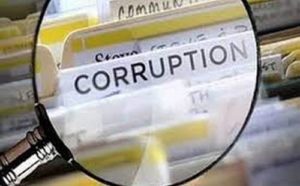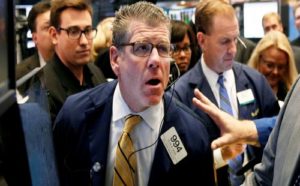Banks are running out of time to regain public trust
Isaiah lived in a time when Judah was struggling under the weight of injustice: “Justice is driven back, / and righteousness stands at a distance; / truth has stumbled in the streets, honesty cannot enter. / Truth is nowhere to be found, / and whoever shuns evil becomes a prey. / The LORD looked and was displeased / that there was no justice” (Isaiah 59:14–15). God’s message for them was simple: “Learn to do right; seek justice. / Defend the oppressed. / Take up the cause of the fatherless; / plead the case of the widow” (Isaiah 1:17). Later, God tells them to “loose the chains of injustice” (Isaiah 58:6; cf. Psalm 82:3), indicating that injustice is a form of bondage and oppression.
Corrupt bank scandals are magnified by each other, loan to own schemes which destroy the small businessman on a regular basis, Goldman Sachs bankers seem to have a corner on the market along with Bank of America just to mention a few bad corrupt banks. They’re part of a pattern, lawlessness, greed, self-centered ambition, one that the American public is hyper aware of. These headlines foment mistrust in the fairness of the entire system, Bank are corrupt by design….
It’s not exactly news that banks have seen their reputation with the public tumble since the financial crisis, but what gets talked about less frequently is what’s at risk for the industry if it can’t turn public opinion around.
A lack of widespread trust raises questions about banks’ relevance in the digital age and leaves them open to further political attack.
#Fraud #Banks #Money #Corruption

A recent review of polling data published by the American Enterprise Institute sheds some light on the underlying trend here. The public remains skeptical about banks and particularly the people running them.
The crisis “put a real scare in the American public,” said Karlyn Bowman, the AEI senior fellow who compiled the survey data. “The hangover is still there.”
That’s especially true for banking executives — likely an overhang from frustrations that so few individuals were punished for their role in the crisis. Only 14% of people had “a great deal” of confidence in the people running banks, the latest data from 2016 show, down from roughly 30% before the crisis. Another third had “hardly any” confidence in banking leaders — up from about 10% in pre-crisis times.
#Money #Steal #BadBanks #Bad #Bankers #Fraud #Crushthepeople #BadBankers
While confidence in banks (as opposed to bank leaders) has ticked up slightly over the past decade — some 30% of people had “a great deal” or “quite a lot” of confidence in financial institutions as of this year — that’s still down from closer to 50% before the housing collapse. At the same time, two-thirds of people reported in 2015 that they felt the financial system was no more secure than before the crisis, and a similar proportion said last year that they predict another crisis like 2008 could be just around the corner. (One bright spot: 90% of respondents to one poll seem to be satisfied with their personal bank.)
What’s at stake? Customers have more choice than ever when it comes to where they do their banking, including from an increasing array of fintech competitors with arguably less cultural and emotional baggage than the traditional banking industry.
Banks remain “highly vulnerable to disruption from tech companies,” said Dan Ryan, banking and capital markets leader at PwC. “The banking industry must continue to work hard to gain public trust and confidence.”
And while the Republican administration and Congress have blunted some of the political threat for now, a “blue wave” this November could have banks playing defense once more. Skepticism about the industry emboldens critics who would like to see banks, especially the country’s largest institutions, subject to tougher rules — or even broken up.
Banking
June 2019
The less-than-positive public outlook gives license to the extreme parts of the political establishment to vilify bankers,” said Con Hurley, a professor of banking law at Boston University. Source
Banks have revamped many of their operations over the last decade, and they’ve spent billions of dollars complying with a host of new rules. But if they can’t figure out a way to win back more of the public’s trust, all that work could be for nothing.
StevieRay Hansen
Editor, HNewsWire.com
It is impossible to find anyone in the Bible who was a power for God who did not have enemies and was not hated.
“Pedophile priests” have reverberated throughout America. But beneath our anger and revulsion, a fundamental question pulsates: Are those who abuse their positions of trust to prey upon children—a category certainly not limited to those in religious orders—sick … or are they evil? We need the answer to that fundamental question. Because, without the truth, we cannot act. And until we act, nothing will change.
My job is protecting children. It has taken me from big cities to rural outposts, from ghettos to penthouses, and from courtrooms to genocidal battlefields. But whatever the venue, the truth remains constant: Some humans intentionally hurt children. They commit unspeakable acts—for their pleasure, their profit, or both.
In the book of James, we see more deeply into the heart of God regarding injustice. God is not petty or obsessive. He does not value justice simply for the sake of having orderliness. There are deeper issues at stake. In James 2, we see a discussion about partiality. James speaks to a group of believers who have been judging the people in their gathering according to their social status. In the human heart, injustice is a sign of partiality, judgmentalism, and a lack of love. When we strive to be righteous by our own human measurements, we invariably forget God’s measurement: perfection. Anything less than perfection is, to God, a scale out of balance.
Every human is, because of the fall, unjust. We do a lot of incongruent things. We make mistakes, we blow hot and cold, we do and say things that are totally contradictory. As James says, “We all stumble in many ways” (James 3:2). Injustice permeates our lives, as we judge unfairly and hold others to a different standard than we are willing to abide by ourselves.
The only way to truly escape injustice is to first accept that God is perfectly just and humans are inherently unjust, i.e., less than perfect, and then to accept God’s righteousness (1 John 1:5–9). Only when we are no longer concerned with making ourselves righteous can we trust the One who justifies the ungodly (Romans 4:5). Then, as God’s children, we can see clearly to combat the injustice around us with a merciful attitude (Micah 6:8; James 1:27).
Jesus is totally just; there is no injustice in Him at all. Because of His perfection, Jesus can provide true justice. In fact, “the Father judges no one, but has entrusted all judgment to the Son” (John 5:22). We look forward to the time when righteousness and justice will be the order of the day and injustice will be banished forever: “Of the greatness of his government and peace there will be no end. He will reign on David’s throne and over his kingdom, establishing and upholding it with justice and righteousness from that time on and forever. The zeal of the LORD Almighty will accomplish this” (Isaiah 9:7). Source
#Antichrist #evildoers #suppressingtruth #birthpains #tribulation #sevenyears #hellonearth #those that have ears, let him hear, those that have eyes let them see!
“Hate speech” is a completely made-up concept with no actual definition or meaning
MY MISSION IS NOT TO CONVINCE YOU, ONLY TO INFORM…
![]()





